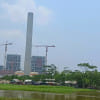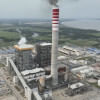Bangladesh power system gets dirtier on rapid coal use growth

Coal is on course to overtake natural gas as the primary source of electricity in Bangladesh, worsening regional emissions and complicating global efforts to cut use of high-polluting fossil fuels.
Bangladesh power firms more than doubled coal-fired electricity generation in 2023 from 2022 to a record 17 terawatt hours (TWh), data from energy think tank Ember shows.
Over the same period, natural gas-fired electricity output increased by just 4.7 percent to 47.44 TWh.
The sharp jump in coal use relative to natural gas use resulted in a large swing in the country's electricity generation mix, with coal accounting for a record 21.1 percent share of total generation, up from just 7 percent two years before.
The share of natural gas-fired output fell to around 59 percent in 2023 from 66 percent in 2021 and 76.4 percent in 2019.
If utilities keep increasing coal-fired generation at a faster pace than gas-fired output, coal could emerge as the primary source of electricity in Bangladesh within the current decade, undermining worldwide efforts to cut coal use.
Bangladesh, among the world's largest clothing producers and exporters, has experienced sharp growth in energy demand from its population and businesses. The country has garment factories that consume power around the clock, and overall energy use also has climbed along with economic growth.
Real gross domestic product (GDP) growth in Bangladesh has averaged 6.2 percent over the past five years, more than twice the global average, according to the International Monetary Fund.
Using Internet of Things technology developed by Cisco, these wired plants will provide researchers with continuous updates on their health and hydration.
The county's power suppliers have struggled to keep up, resulting in regular power outages last year.
To avoid similar setbacks in 2024, authorities have directed electrical power generators to use more coal, and have approved record large coal imports.
The country already receives regular thermal coal supplies by truck and train from neighbour India, but in 2023 also boosted seaborne imports by 47 percent to a record 12.7 million metric tons, according to ship tracking data compiled by Kpler.
Bangladesh's average annual seaborne imports from 2017 to 2021 were 6.8 million tons, so the jump to close to 13 million tons last year helped lift the country to 12th on the list of global thermal coal importers in 2023, from 14th in 2022.
With several nations taking steps to steadily reduce coal-fired power generation and imports, Bangladesh will likely rise further in coal import rankings.
Coal-fired generation has pushed Bangladesh power sector emissions to record highs: just under 60 million tons of carbon dioxide emissions in 2023, up from 58.3 million tons in 2022, according to Ember.
That emissions load was roughly a 24 percent rise from 2019.
The carbon intensity of electricity generation has also climbed. Roughly 741,500 tons of carbon dioxide was emitted to generate each kilowatt hour of electricity produced in 2023, up from 723,200 tons in 2022 when coal use was roughly half of the levels seen in 2023.
Coal-fired generation is still rising, with 2.11 TWh of electricity generated from coal in January, up sharply from 0.83 TWh a year earlier.
Imports of thermal coal are also rising, with seaborne purchases through March totalling just over 3 million tons, up from around 2.5 million tons during the same period in 2023.
If Bangladesh's coal use and imports remain strong, 2024 will likely set a record for both coal-fired generation and emissions. It could potentially offset any declines seen elsewhere in terms of coal consumption and pollution, with Bangladesh emerging as a hub for coal demand even as much of the rest of the world turns its back on the fuel.

 For all latest news, follow The Daily Star's Google News channel.
For all latest news, follow The Daily Star's Google News channel. 








Comments